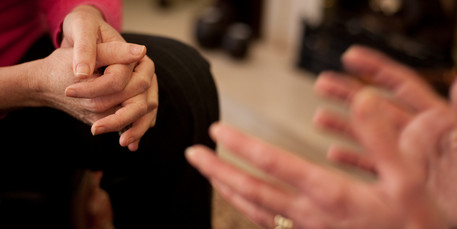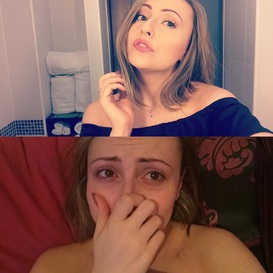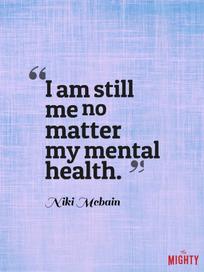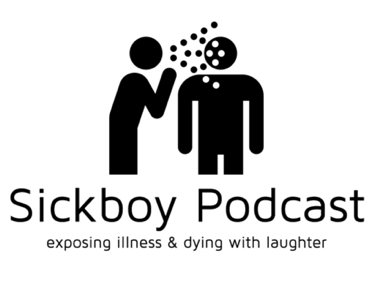The evidence to support psychotherapy, specifically cognitive behavioral therapy and acceptance based therapies, for the treatment of generalized anxiety disorder has been accumulating for years. Health care providers understand that benefits of such therapies, and often refer their patients on to psychologists, counsellors, social workers, and psychiatrists as they are the experts in delivering such treatment. Unfortunately, the wait times to get in to see a professional can serve as a large obstacle for patients who are suffering from anxiety at current.
1 Comment
Can you imagine experiencing long lasting bouts of severe depression that are intermittently interrupted by periods of extremely elevated mood (Bipolar I) or mildly elevated mood (Bipolar II)? Those who live with Bipolar Disorder often voice that life feels a bit like a roller coaster until they figure out what works for them individually to keep the symptoms of this disorder at bay. The boys at “SickBoy Podcast” interviewed Nadine MacLellan about her experience living with Bipolar II disorder. This is one of many podcast episodes where the hosts of SickBoy talk to people who are living with chronic illness to promote awareness and education through laughter and insightful discussions. If you want to learn more about what it is like to live with Bipolar II, check October 05 2015 episode of SickBoy Podcast with Nadine. http://www.sickboypodcast.com/episodes/2015/10/5/sickboy-bipolar-ii
If this caught your attention and you are interested in learning more about people living with chronic illnesses check out the other episodes on iTunes (https://itunes.apple.com/ca/podcast/sickboy-podcast/id1034035933?mt=2). @Sickboypodcast #SICKTALKSICK @Beyond_The_Body A university in the United States is in the spotlight for a new program it recently implemented requiring mandatory student use of FitBits. The hope was to help promote physical health and fitness amongst college students, however, the National Eating Disorders Association has taken a stand against this program, stating that #fitness #technology can be especially dangerous for those experiencing or susceptible to #eating #disorders. Read more here:
http://www.fox23.com/news/local-university-under-fire-from-national-eating-disorder-association/225456240  In her third poem, poet Brenda McDonald shares her experiences of being in therapy for her anxiety and depression, highlighting the importance of human connection, of empathy, of support, and of having a safe space to try and work through the confusion and internal turmoil. Therapy Open door, closed door Same place each week Share what is deep down Someone who listens to me Connection is vital to healing Kindness and empathy, thank you I try to embrace all that is said Gremlins don't allow, so sorry Vulnerable within the four walls Time is up, I must leave Back to being alone No one to lean on What does it take to believe Back and forth talk ends too soon Internal tears flow freely afterwards Only temporary safe place Lost, what should I do Words don't always explain Between the cracks, looking up Trapped in my struggling mind Time drifts by as I think Ruminate, round and round Rituals steal hours from me Give me back my sanity Falling down the hole Deeper into the ground Light is getting dimmer Reach out, I need help Life is good, why do I suffer Stomach wrenched, pain Anxious, who really knows me Too complicated, many directions Heaviness of soul, hopeless of heart Help me know you care, I'm broken Love is as necessary to life as breath Where is my self-love, stop the voices Hide behind the mask, who am I Without illness, would I exist Held down with chains of fear Why does loneliness infiltrate me Other people live their lives I observe, I dream, I wish Will tomorrow be any different Back to the four walls  Recent research is helping us begin to understand the complexities of transgender #mentalhealth. A number of these studies have demonstrated that this particular population tends to be at increased risk of poorer mental health in the form of increased rates of substance use, and disorders like depression. The article below in particular, looks at two new studies, one of transgender children and the other of transgender women in their late adolescence and early adulthood to begin to help us explore the question of whether transgendered individuals' mental health is related more to external factors such as discrimination and support and validation (or lack thereof) from family/society, or more closely linked to internal factors such as gender dysphoria. "Only a quarter of the women were white, and all were between ages 16 and 29. The researchers, led by Sari Reisner, a research fellow at Harvard Medical School and Boston Children's Hospital, found that the rate of psychiatric disorders and substance dependence among these women was 1.7 to 3.6 times greater than in the general population. Four in 10 of the women had a mental health or substance dependence disorder, and 1 in 5 women had at least two diagnosed psychiatric conditions. More than a third of them had experienced depression, and 1 in 5 women had contemplated suicide in the past month. Rates of anxiety, post-traumatic stress, alcohol dependence and other substance dependence also was higher than average." For the full story, click here: http://www.npr.org/sections/health-shots/2016/03/23/471265599/probing-the-complexities-of-transgender-mental-health  Early in April, Amber Smith shared two photos of herself on her Facebook page; one in which she is all dressed up, an image she describes as the "normal" version of herself she showcases to the world, and the other of her "true normal" self only she tends to see shortly after she's had a panic attack. Amber posted the photos in an effort to break down the stigma of invisible conditions such as anxiety and depression, and demonstrate just how often people assume that because one appears youthful and fine (an image often portrayed by our social media presence), you can’t experience severe and debilitating mental health conditions.Rather Amber's photos work to highlight how mental illness does not discriminate and encourages us to recall the old adage of "not judging a book by its cover". Smith also hopes that her photos helps others who are also struggling in silence and provides them with the courage and encouragement they need to seek help. "‘Do you know how many people that equates to worldwide?! And yet I’ve been battling with anxiety and depression for years and years and there’s still people that make comments like “you’ll get over it”, “you don’t need tablets, just be happier”, “you’re too young to suffer with that'"... Shockingly, she described a conversation she had recently been a part of, where someone actually had the audacity to ask her: ”Aren’t you too young to be suffering with anxiety and depression? What do you actually have to be depressed about at your age?” To read more click here: http://metro.co.uk/2016/04/06/girl-speaks-out-about-battle-with-anxiety-with-photos-taken-minutes-after-a-panic-attack-5798797/ For many, food is one of life's great pleasures and joys. For those suffering from #eating #disorders, food brings about immense anxiety, distress, and "noise". Learn more about these important cognitive pathways that are disrupted when someone suffers from an eating disorder here:https://www.youtube.com/watch?v=UEysOExcwrE
 In her second poem "What Does That Mean To You", poet Brenda McDonald, shares some powerful thoughts about mental illness, including how mental health conditions do not discriminate. In addition, Brenda's poem is a reminder to us all that mental illness does not define an individual, and that by continuing to talk about mental health and by being empathetic and understanding we can really help support those suffering with mental health conditions. What Does That Mean To You? "Person with mental illness" What does that mean to you? Can I be a leader, specialist, educator And have that label too? No one is immune from the piercing claws of depression Life-altering anxiety cripples one's mind. apprehensive intrusion Money, education and career don't protect from mental health concerns Suicide claims our loved ones lives; no gender, age, social or cultural exclusion I have mental health issues But 'who I am' is so much more I'm not my depression or my anxiety Look to my heart, my soul, my core Value experience and education together Each one of us, we are unique but united Take time for and learn from one another Real face to face time, human contact ignited Listen openly to what I am saying Show me, I need to know you care, Being vulnerable is a place to start To reduce stigma, we must share Look beyond the words spoken Body language talks, be aware Hiding behind the mask happens Notice hope replaced with despair Why does my life matter? Why live? Many ask these questions every day Reach out with empathy, a loving touch "I'm here for you, I'm not leaving, OK?" Humans have so much to offer in this world We have unlimited love and learning potential Our minds can take us to mountain tops and valleys Taking care of our mental health is essential Life is complex, so many paths to travel down We may be on a dangerous road, reroute now No one's on a pedestal; no person is better than you or me For those dealing with mental illness, let's help somehow "Person with mental illness" What does that mean to you? Can I be a leader, specialist, educator And have that label too?  Put your knowledge and skills to the test with the case of Mr. K, a 36 year old male, who presents to the ER with his wife, with new symptoms of elevated mood and self-esteem, decreased sleep, increased speech, racing thoughts, distractibility and increased goal-directed activity. They report that these symptoms began 10 days ago after they returned home from a cruise vacation. Mr. K has no past psychiatric medication or recent substance use. His family history is significant for a brother who had a single manic episode and past suicide attempt in his adolescence. Mr. K is employed at a biotechnology company, where he does shiftwork, however since returning from his cruise, he has been unable to go to work due to his current symptoms. Mr. K does not take any regular medications however, he reports using scopolamine for motion sickness on the cruise, and his wife tells you that she believes this may have led to his developing mania. What would you say to Mr. K and his wife? What is Mr. K's diagnosis? How would you treat his manic symptoms? "Manic After Taking A Vacation" by Embay Tan (Current Psychiatry). If you've ever pulled an "all-nighter" whether when studying for exams or because you were up all night on call, you may remember not feeling or functioning at your best the next day secondary to the sleep deficit. In the article below, we learn of the impact sleep (or lack there of) can have on our brains and on our mental health.
As you may have heard before and growing evidence is showing, sleep is quite important for those with mental illness. In addition when patients report sleep disturbances it may also help us identify conditions like depression and bipolar disorder. In this article, we learn of how being mindful of our patients' sleep when diagnosing and treating mental illnesses can be incredibly important and beneficial. "Sleep abnormalities have indeed been identified in individuals prior to mental illness. For example we know that sleep disruption usually happens before an episode of depression. Furthermore, individuals identified as “at risk” of developing bipolar disorder and childhood-onset schizophrenia typically show problems with sleep before any clinical diagnosis of illness. Such findings raise the possibility that sleep and circadian rhythm disruption may be an important factor in the early diagnosis of individuals with mental illness. This is hugely important, as early diagnosis offers the possibility of early help. It is also plausible that treating the actual sleep problems will have a positive impact upon the level of mental illness. A recent study managed to reduce sleep disruptions using cognitive behavioural therapy in patients with schizophrenia who showed persecutory delusions and found that a better night’s sleep was associated with a decrease in paranoid thinking along with a reduction in anxiety and depression. So the emerging data suggests treating sleep problems can be an effective means to reduce symptoms." For the full article, click here: https://www.weforum.org/agenda/2015/11/how-sleep-and-mental-health-are-linked-in-the-brain/?utm_content=buffer0592b&utm_medium=social&utm_source=twitter.com&utm_campaign=buffer |
Description
Supporting and enhancing students' and health professionals' knowledge and understanding of mental health and psychiatry
Archives
June 2017
Categories
All
|



 RSS Feed
RSS Feed
